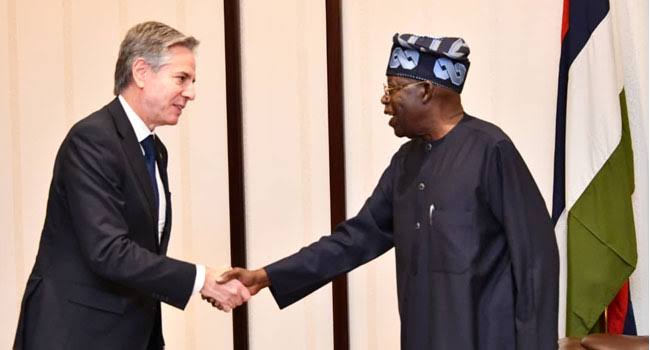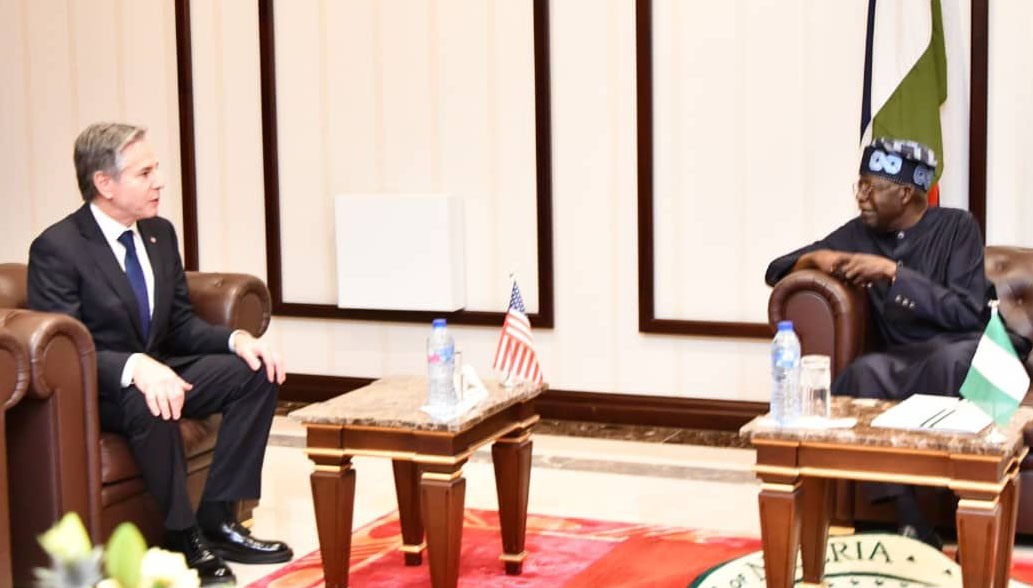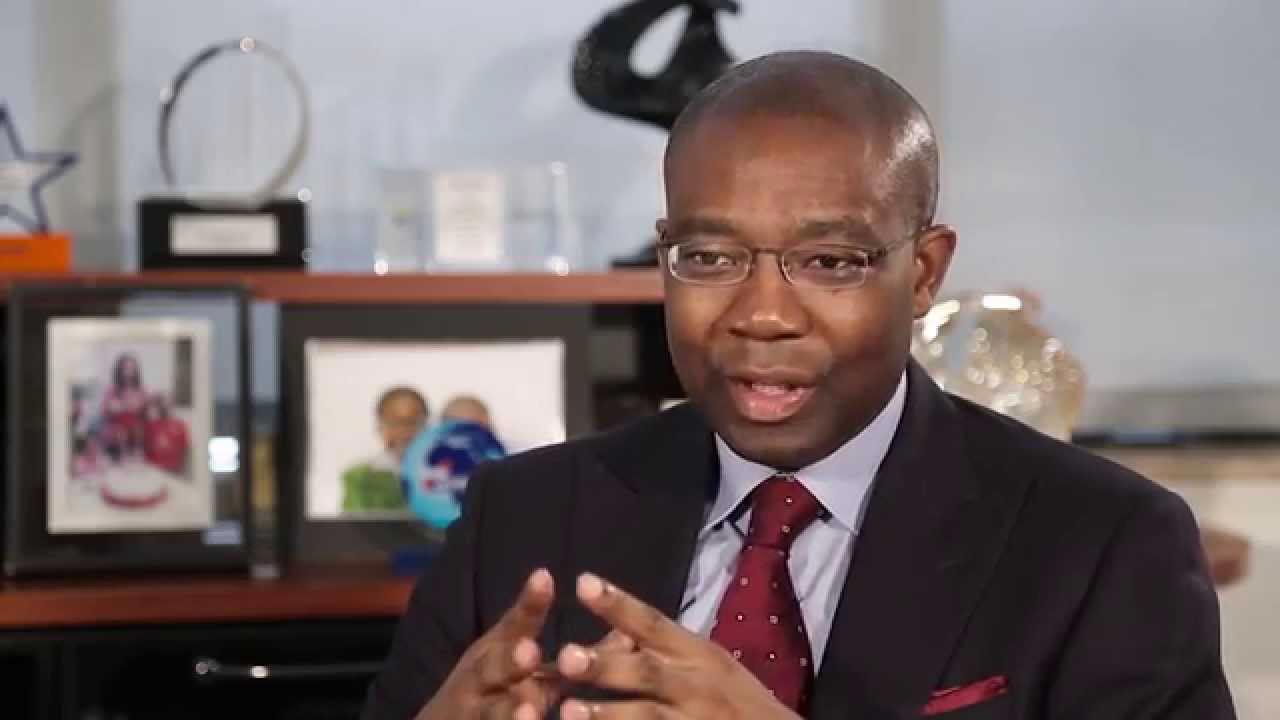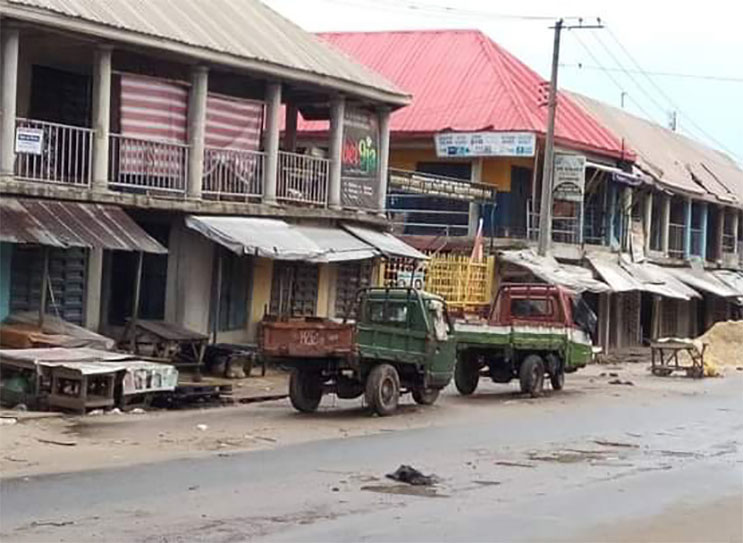
• Blinken: A secure, democratic, prosperous Nigeria good for Africa, U.S. and the world
• Pledges $45m to tackle insecurity in Nigeria, other West African nations
• Nigeria got $2.5b in security assistance since 2017
• Tuggar seeks democratisation of UN Security Council
United States Secretary of State Antony Blinken yesterday pledged $45 million in additional financing to tackle the escalating security concerns in Nigeria and neighbouring coastal West African countries, where insecurity linked to jihadist insurgencies has increased in recent years.
The funding will supplement $300 million the U.S. has already invested in coastal West Africa over the past two years to help bring stability to the region. Since 2017, U.S. security assistance to Nigeria has totalled approximately $650 million, in addition to $1.8 billion in foreign military sales.
Blinken, who arrived Abuja yesterday evening, is on the third stop of a four-nation tour of Africa taking him to Cape Verde, Ivory Coast, Nigeria and Angola from January 21-26 as he seeks to reinforce the U.S. commitment to stronger relations with democracies in the sub-region amid global crises.
The purpose of the trip is to discuss U.S.-African partnerships over trade, climate, infrastructure, health, security and other issues, following a summit in Washington with African leaders in December 2022.
Security challenges in West Africa, the fallout of a coup in Niger last year and Russia’s growing influence in the region are among key topics during Blinken’s trip. He announced the extra financing at a joint press briefing in Ivory Coast’s financial capital Abidjan after meeting President Alassane Ouattara yesterday.
Ivory Coast is one of several coastal West African countries impacted in recent years by Islamist insurgencies that took root in Mali in 2012 and spread across the Sahel region despite costly, internationally backed military efforts to contain it.
The U.S. faced a setback in its fight against militants in the Sahel when military officers toppled Niger’s President Mohamed Bazoum, a key ally, in July last year. The coup in Niger was one of a series of military takeovers or attempted power grabs that occurred in West and Central Africa over the past three years.
The instability has raised concern, particularly as juntas have cut ties with traditional Western allies such as the European Union and France, which withdrew thousands of troops from the Sahel last year.
Blinken, prior to his trip to Nigeria, also met Akinwumi Adesina, president of the African Development Bank (AfDB), at a sub-regional rice research institute in the country.
According to Blinken, the presence of the United States in Africa is driven by a straightforward reality – the destinies, populations, and prosperity of America and Africa are more interconnected than ever before.
“We’re here for a very simple reason – because America and Africa’s futures, their peoples, their prosperity are linked and joined as never before. We spent a lot of time discussing mutual security challenges.”
Last night, President Bola Tinubu held a bilateral meeting with Blinken. On arrival at the Presidential Villa in Abuja, he was received by the Secretary to the Government of the Federation, Senator George Akume and Minister of Foreign Affairs, Yusuf Tuggar.
The U.S. top diplomat on arrival was received at the forecourt leading to President Tinubu’s office at about 6.55p.m. Among other top government officials who received him were Chief of Staff to the President, Femi Gbajabiamila; Minister of Information and National Orientation, Mohammed Idris; and Minister of Solid Minerals Development, Dele Alake.
In a briefing after Blinken’s meeting with President Tinubu, the Foreign Affairs Minister, Yusuf Tuggar, said he intends to hold bilateral talks on security cooperation among others. Tuggar later held talks with Blinken with a focus on deepening democracy in the West African subregion, strengthening trade relations and security cooperation.
The minister also planned to use the opportunity to urge the U.S. and the wider international community to give serious consideration to multilateral reforms, particularly that of democratizing the United Nations Security Council.
Recall that Tuggar at the just concluded World Economic Forum (WEF) said there was a need to democratise the United Nations (UN) security council because it is “clumsy and not working”.
He said the values of democracy such as the rule of law should be replicated in the world’s highest decision organs. “What we have to do is collectively practice what we preach. The values that we uphold democracy, rule of law need to be practised, and we need to see them being practised in the very decision-making bodies or entities for the planet.
“So, to begin with, the UN Security Council needs to be democratized. Clearly, it is not fit for purpose. We should do away with the veto powers on the UN Security Council; clearly, it’s clumsy and not working. Again, when you look at the global security architecture, it is impacted by such undemocratic entities that influence decisions.”
Key priorities of the visit include bolstering security partnerships and enhancing health and economic development in the region, among others before he departs later for Lagos where he is scheduled to meet with the business community and representatives from civil society to discuss the U.S.-Nigeria bilateral relationship and commitments made during the U.S.-Africa Leaders’ Summit, including in the areas of climate, food security, and health security.
On the broad areas of interest, Blinken will also emphasize economic partnership and how the United States is investing in infrastructure in Africa to boost two-way trade, create jobs at home and on the continent, and help Africa compete in the global marketplace.
Additionally, the Secretary of State will advance security partnerships based on shared values such as respect for human rights, including freedom of religion or belief, promotion of democracy, and expansion of the rule of law.
On U.S.-Nigeria relations, Blinken noted that “our partnership with Nigeria, Africa’s largest economy and democracy, is built on shared interests and values, as well as strong people-to-people ties. A secure, democratic, healthy, and prosperous Nigeria is good for Nigerians, Africa, the United States, and the world. The United States and Nigeria enjoy a deep and enduring partnership that spans more than six decades.
“We invest in Nigeria’s economic growth and advance trade through both private sector engagement and government-supported initiatives such as the West Africa Trade and Investment Hub, Prosper Africa, and Power Africa. The United States provided nearly $1.2 billion in FY 2022 in foreign assistance resources to Nigeria —supporting economic development, education, democracy, health, energy and climate, humanitarian relief, security, and more.
“The United States is also a steadfast partner in strengthening Nigeria’s health sector. U.S. health investments and partnerships in Nigeria – such as the U.S. President’s Emergency Plan for AIDS Relief (PEPFAR), the U.S. President’s Malaria Initiative (PMI), and global health security intensive support partnership program have saved millions of lives, strengthened health systems, and better equipped Africa and the world to prevent, detect, and respond to existing and future health threats. The United States invested more than $570 million last year to help prevent illnesses like HIV, tuberculosis, and COVID-19 in Nigeria.”
On economic, trade and investment ties, Blinken added that Nigeria is America’s second-largest trading partner in Africa with two-way trade exceeding $10.6 billion in 2022. “The United States is proud to be one of the largest foreign investors in Nigeria with foreign direct investment totaling $5.6 billion in 2022.
“Technology is playing an ever-increasing role in the deepening of the U.S.-Nigeria relationship and our relationships across the continent. The partnership includes significant investments in Nigeria’s tech ecosystem, and we are using the latest technological innovations to address some of the world’s most pressing challenges, in education, healthcare, agriculture, and other vital areas of development and economic growth.”

“On democracy and human rights, because we believe elections are central to Nigeria’s democracy, for the 2023 elections, we supported 44 civil society organizations to provide civic and voter education to 68 million Nigerians.
“We are a steadfast partner in seeking to strengthen election processes that enhance capacity to meet citizens’ expectations, and in pursuing innovative projects to help communities peacefully resolve differences without violence.”
The American diplomat added that Nigeria has one of the highest numbers of African participants each year in the Fulbright Program, as well as participants in the Mandela Washington Fellowship, TechWomen, and the International Visitor Leadership Program.
“More than 12,000 education and exchange program alumni hail from Nigeria. Over 17,000 Nigerians are studying in the United States, making Nigeria seventh among sending countries around the world. Through EducationUSA, the U.S. Mission in Nigeria advised 80,000 prospective students in 2023 and helped secure nearly $30 million in scholarships for bright and underserved students through its Opportunity Funds Program.
“In 2023, Nigeria’s network of American Spaces reached over 56,000 participants through approximately 2,000 programmes focused on civic engagement, women’s participation in politics, STEM education, entrepreneurship, and youth development. The U.S. Mission in Nigeria, in collaboration with public and private sector partners, supports capacity building programs for young Nigerians in creative industries.
“Since 2017, over 500 emerging filmmakers have participated in workshops led by U.S. filmmakers, in collaboration with the Department of State’s American Film Showcase and Global Media Makers ECA programmes. Moreover, Mission Nigeria has contributed to the development of the creative ecosystem by supporting various film, theater, and arts festivals, such as the Africa International Film Festival, Africa Creative Market, Abuja Open House, Ake Arts and Book Festivals, and more.
“The United States and Nigeria enjoy strong bilateral cooperation on cultural heritage protection and preservation and signed a bilateral cultural property agreement in January 2022. Nigeria is one of only two countries in sub-Saharan Africa with a similar agreement with the United States. Nigeria has received over $1.3 million for 15 projects from the U.S. Ambassadors Fund for Cultural Preservation.”





